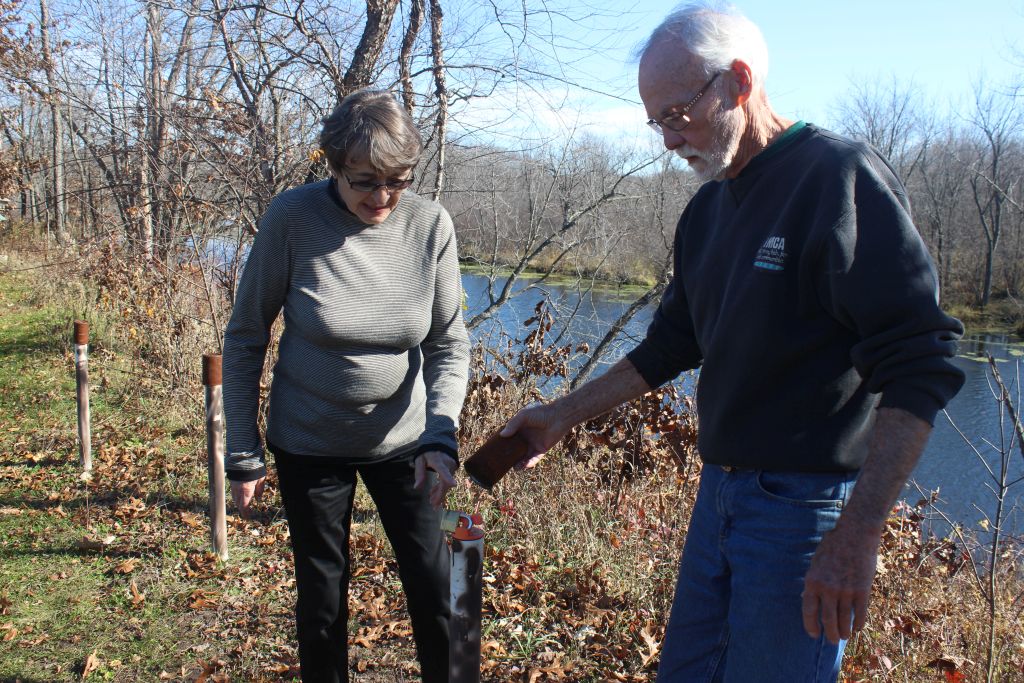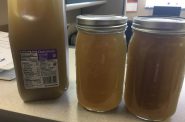Nitrate Pollutes State’s Drinking Water
Chemical is at unsafe levels in estimated 94,000 Wisconsin households.
Well testing is rare
Private well owners in Wisconsin are not required to test their wells, and very few have done so, let alone on the annual schedule that public officials recommend. In some areas, even annual tests may not be often enough to guarantee safe water because pollution can spike one month and disappear the next.
Petitioners Sherryl and Doug Jones feel the state Department of Natural Resources has left residents to fend for themselves when it comes to ensuring the quality of their water.
What do the Joneses want?
“We all are entitled to clean water, drinking water,” Doug Jones said. “There’s no reason why with this day and age and all the science and technology that something can’t be done to improve the situation because it just seems to be getting worse.”
Others favor a change in state law, including mandatory testing of private wells.
“Leaving it up to the individual citizen is just not good public health policy,” pediatrician Neary said.
Masarik, who spends much of his time encouraging people to test their wells, cautions that such a requirement could add a layer of bureaucracy without making the public any safer. What would well owners whose tests found nitrate be required to do?

Doug and Sherryl Jones show a monitoring well on their property in rural Spring Green. The couple’s drinking water was found in 2007 to contain twice the health limit for nitrate. They initially switched to bottled water but now have a reverse osmosis system to remove nitrate. The Joneses are among 16 petitioners seeking to force the state Department of Natural Resources to better enforce part of the Clean Water Act. Photo by Bridgit Bowden of the Wisconsin Center for Investigative Journalism.
In some situations, “you kind of have to weigh your options,” he said. “The government is not going to be able to make those decisions for them.”
Masarik believes the government’s most helpful role is educating health care providers, local health departments and rural well owners about their responsibility to test their water, especially when buying a piece of property or when a baby is on the way.
Short-term fixes costly
The cost of solving a nitrate problem for a household can run from hundreds of dollars a year for bottled water or water treatment systems to thousands of dollars to drill a new well. Treatment systems, in particular, require maintenance — and are no guarantees of safety, as another case from the Wisconsin Medical Journal illustrates.
Case 4 was a baby girl from Eau Claire County weighing 6 pounds and 10 ounces. She had been healthy for the first month of life. But she started to throw up after feedings and had loose stools. She was treated for dehydration and went home the next day.
Six days later she was readmitted and was described as “wasted and dusky,” or in other words, blue.
She had drunk formula made with well water. The family knew the water was contaminated and was filtering it with a reverse osmosis system.
A water sample taken while Case 4 was hospitalized showed nitrate at 9.9 milligrams, right near the health standard, with later samples at 12.5 and 23.5 milligrams per liter.
It turned out the family’s solution — a filter — was no solution at all.
Reporter Bridgit Bowden contributed to this report. Portions of the series were produced in collaboration with journalism classes participating in The Confluence, a project involving the Wisconsin Center for Investigative Journalism and the University of Wisconsin-Madison School of Journalism and Mass Communication. The nonprofit Wisconsin Center for Investigative Journalism (www.WisconsinWatch.org) collaborates with Wisconsin Public Radio, Wisconsin Public Television, other news media and the UW-Madison School of Journalism and Mass Communication. All works created, published, posted or disseminated by the Center do not necessarily reflect the views or opinions of UW-Madison or any of its affiliates.
Tainted Water
-
Fecal Microbes In 60% of Sampled Wells
 Jun 12th, 2017 by Coburn Dukehart
Jun 12th, 2017 by Coburn Dukehart
-
State’s Failures On Lead Pipes
 Jan 15th, 2017 by Cara Lombardo and Dee J. Hall
Jan 15th, 2017 by Cara Lombardo and Dee J. Hall
-
Lax Rules Expose Kids To Lead-Tainted Water
 Dec 19th, 2016 by Cara Lombardo and Dee J. Hall
Dec 19th, 2016 by Cara Lombardo and Dee J. Hall
















